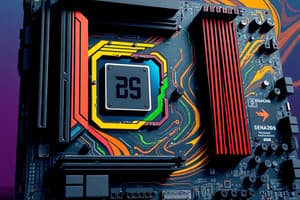Podcast
Questions and Answers
Which of the following is NOT a hardware component of a computer?
Which of the following is NOT a hardware component of a computer?
- RAM
- CPU
- Operating System (correct)
- Motherboard
The Central Processing Unit (CPU) is primarily responsible for rendering graphics.
The Central Processing Unit (CPU) is primarily responsible for rendering graphics.
False (B)
What is the function of a Cooling Fan in a computer?
What is the function of a Cooling Fan in a computer?
To dissipate heat generated by the CPU and GPU.
The GPU is specialized in rendering images and videos faster than the _____ and is used for gaming tasks.
The GPU is specialized in rendering images and videos faster than the _____ and is used for gaming tasks.
Match the following components with their primary functions:
Match the following components with their primary functions:
Which type of storage device is known for being faster but more expensive than an HDD?
Which type of storage device is known for being faster but more expensive than an HDD?
The motherboard is primarily responsible for storing data on a computer.
The motherboard is primarily responsible for storing data on a computer.
What is the primary purpose of the Power Supply Unit (PSU) in a computer?
What is the primary purpose of the Power Supply Unit (PSU) in a computer?
An ____ drive uses optical discs such as CDs, DVDs, and Blu-rays to store data.
An ____ drive uses optical discs such as CDs, DVDs, and Blu-rays to store data.
Match the following computer components with their functions:
Match the following computer components with their functions:
Flashcards are hidden until you start studying
Study Notes
Introduction to Computers
- A computer is an electronic device that processes input data and provides output.
- Composed of hardware (physical parts) and software (programs and data).
Hardware Components
- Hardware includes tangible elements like the motherboard, CPU, RAM, hard disk, etc.
Central Processing Unit (CPU)
- Acts as the brain of the computer, controlling operations and executing instructions.
- Performs arithmetic, logical, and I/O operations essential for software operation.
Graphics Processing Unit (GPU)
- Handles rendering of images, videos, and animations.
- Executes complex calculations to convert 3D models into 2D visuals for display.
Cooling Fan
- Essential for maintaining optimal CPU and GPU temperatures.
- Prevents overheating, which can lead to system crashes or freezes.
Storage Devices
- Storage devices are crucial for holding digital information.
Hard Disk Drive (HDD)
- Main data storage device, retaining music, videos, applications, etc.
- Utilizes magnetic disks for large capacity and quick data access.
Solid State Drive (SSD)
- Faster than HDDs, leveraging flash memory for data storage.
- More efficient but generally more costly compared to traditional HDDs.
Optical Drive
- Reads and writes data on optical discs such as CDs, DVDs, and Blu-rays.
Interconnects & Peripherals
- Interconnects facilitate the connection and data transfer between computer components.
- Peripherals are devices that interact with the computer, categorized as input (e.g., keyboard, mouse), output (e.g., printer), or storage (e.g., external hard drives).
Motherboard
- The primary circuit board that links all computer components, ensuring smooth integration and communication.
- Houses critical components like the CPU and RAM, which are vital for processing and temporary data storage.
Expansion Cards
- The motherboard includes slots for expansion cards to enhance functionality (e.g., graphics, sound, and network cards).
Power Supply Unit (PSU)
- A critical component providing electrical power to all other computer parts.
Studying That Suits You
Use AI to generate personalized quizzes and flashcards to suit your learning preferences.




